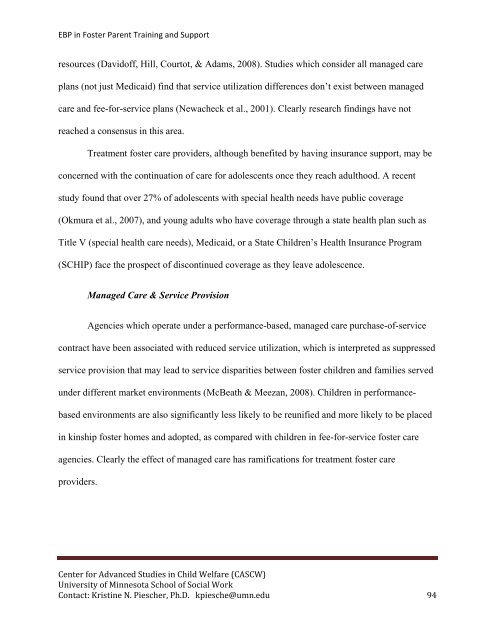EBP <strong>in</strong> <strong>Foster</strong> <strong>Parent</strong> Tra<strong>in</strong><strong>in</strong>g <strong>and</strong> <strong>Support</strong>Recent studies have <strong>in</strong>dicated that many children do not have access to the medicalservices they need. One study found that over a third of the children with autism, over a fifthwith mental retardation, <strong>and</strong> over a fifth with other types of special health care needs hadproblems obta<strong>in</strong><strong>in</strong>g needed care from specialty doctors <strong>in</strong> the preced<strong>in</strong>g year (Krauss, Gulley,Sciegaj, & Wells, 2003). The most common problems <strong>in</strong>cluded gett<strong>in</strong>g referrals <strong>and</strong> f<strong>in</strong>d<strong>in</strong>gproviders with appropriate tra<strong>in</strong><strong>in</strong>g. Adolescents with special health care needs tend to have onemore annual office visit per year <strong>and</strong> report three times the rate of unmet medical needs, despitehigher rates of <strong>in</strong>surance coverage, than adolescents without those needs (Okumura, McPheeters,& Davis, 2007). Children <strong>in</strong> foster care, especially those receiv<strong>in</strong>g SSI benefits, account for adisproportionate share of medical expenditures (Rosenbach, Lewis, & Qu<strong>in</strong>n, 2000).Health <strong>in</strong>surance is imperative for children <strong>and</strong> youth with special health care needs <strong>in</strong> atreatment foster care population. In this population, health <strong>in</strong>surance is positively associated withboth access <strong>and</strong> utilization of services (Jeffrey & Newacheck, 2006; Kraus et al., 2004). Thefamilies of <strong>in</strong>sured children also experience significantly lower out-of-pocket burden <strong>and</strong>f<strong>in</strong>ancial problems as compared to those families whose children are un<strong>in</strong>sured. Because of thelarge proportion of children with special health care needs who reside <strong>in</strong> treatment foster care,hav<strong>in</strong>g <strong>in</strong>surance for these children is a significant support for treatment foster parents.Among those children with health <strong>in</strong>surance, the role of managed care is widely debated.Medicaid coverage <strong>and</strong> public secondary health coverage have been associated with fewer accessproblems (Kraus et al., 2004). However the utilization of services with<strong>in</strong> managed care health<strong>in</strong>surance is disputed. Some studies l<strong>in</strong>k Medicaid managed care <strong>in</strong>surance plans to reducedservice utilization, which is <strong>in</strong>terpreted as improved care coord<strong>in</strong>ation rather than a lack of careCenter for Advanced Studies <strong>in</strong> Child Welfare (CASCW)University of M<strong>in</strong>nesota School of Social WorkContact: Krist<strong>in</strong>e N. Piescher, Ph.D. kpiesche@umn.edu 93
EBP <strong>in</strong> <strong>Foster</strong> <strong>Parent</strong> Tra<strong>in</strong><strong>in</strong>g <strong>and</strong> <strong>Support</strong>resources (Davidoff, Hill, Courtot, & Adams, 2008). Studies which consider all managed careplans (not just Medicaid) f<strong>in</strong>d that service utilization differences don’t exist between managedcare <strong>and</strong> fee-for-service plans (Newacheck et al., 2001). Clearly research f<strong>in</strong>d<strong>in</strong>gs have notreached a consensus <strong>in</strong> this area.Treatment foster care providers, although benefited by hav<strong>in</strong>g <strong>in</strong>surance support, may beconcerned with the cont<strong>in</strong>uation of care for adolescents once they reach adulthood. A recentstudy found that over 27% of adolescents with special health needs have public coverage(Okmura et al., 2007), <strong>and</strong> young adults who have coverage through a state health plan such asTitle V (special health care needs), Medicaid, or a State Children’s Health Insurance Program(SCHIP) face the prospect of discont<strong>in</strong>ued coverage as they leave adolescence.Managed Care & Service ProvisionAgencies which operate under a performance-based, managed care purchase-of-servicecontract have been associated with reduced service utilization, which is <strong>in</strong>terpreted as suppressedservice provision that may lead to service disparities between foster children <strong>and</strong> families servedunder different market environments (McBeath & Meezan, 2008). Children <strong>in</strong> performancebasedenvironments are also significantly less likely to be reunified <strong>and</strong> more likely to be placed<strong>in</strong> k<strong>in</strong>ship foster homes <strong>and</strong> adopted, as compared with children <strong>in</strong> fee-for-service foster careagencies. Clearly the effect of managed care has ramifications for treatment foster careproviders.Center for Advanced Studies <strong>in</strong> Child Welfare (CASCW)University of M<strong>in</strong>nesota School of Social WorkContact: Krist<strong>in</strong>e N. Piescher, Ph.D. kpiesche@umn.edu 94
















